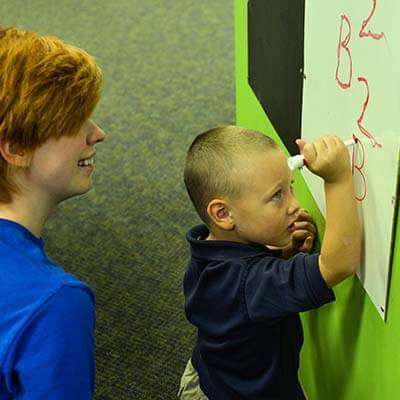How Screening for Autism may Increase the Chance of Success in School
It should be a fun time of year. Many children just entered preschool or kindergarten and are settling into new routines with backpacks and lunch boxes in tow, connecting with new friends and teachers, and already planning after-school activities. Unfortunately for some families, it is not always this simple.
All children will encounter new challenges when heading to school, especially if it is the first time, but some students may experience extra obstacles for which they need a little more help to overcome. Beyond academics, school presents social, emotional and behavioral situations, and some kids may not be developmentally ready to handle them without the proper supports in place.
If there seem to be challenges that are holding your child back from being more successful in school, we advise looking into them immediately. While it’s true some children just have a tougher time adjusting than others, it could be something deeper, like a developmental delay or autism spectrum disorder (ASD), which could highly benefit from interventions like applied behavior analysis (ABA therapy). Think of ABA as the training wheels on a new bicycle.
To help guide parents in the right direction, we created a list of five signs to watch out for that could suggest setting up a diagnostic evaluation. As with all signs of autism, none of these alone mean your child is on the spectrum. However, all are worth discussing with your pediatrician so you can work together to find the solution that gives your child his or her best shot at success in school and life in general.

For children with autism, new school routines can be intimidating and trigger anxiety.
5 School-related Challenges that Could Benefit from a Diagnostic Evaluation:
- Anxiety increases beyond what might typically be considered reasonable.
Depending on the individual, this can appear in a number of different ways. For some, it could emerge as tantrums several times a day or on a daily basis, sometimes lasting up to hours long. The thought of school or a small change in routine could become a trigger for them, leading to meltdowns or panic attacks. Others may begin to display low self-esteem or increased “bad habits” like repeating words over and over, rocking back and forth, or other repetitive behaviors. If your child seems to have extreme stress around the idea of going to school, there may be underlying reasons worth exploring, and behavioral therapy could aid in their progress.
- Sudden issues with sensory overload, especially at school.
Does your kiddo (or the teacher) tell you he or she is easily affected by the lighting, sounds or smells at school? Kids who become overwhelmed or upset by the new noises, crowds and lines may have challenges with sensory-processing. Discuss the sensitivities with your child’s teacher and continue to monitor them. If new sensory issues appear or previous sensitivities worsen, we recommend discussing with your pediatrician.
- Regression in certain areas in the classroom or at home.
New places and new routines can lead to some accidents or regression at first, but if your child consistently has trouble sleeping, eating, speaking or pottying a few weeks into school – and it was previously not an issue – it is worth identifying the root cause so you can intervene.
- A struggle to fit in with others at school.
This sign is not meant to reference the “shy kid,” and instead refers to those who may be unable to interact socially for other reasons. A child who is completely uninterested in peers or has less motivation to engage with them may need help building social skills. The same goes for those who are interested, but are unable to maintain friendships. Sometimes children with autism can become hyper-focused on topics that seem unusual or obsessive and continue to talk about them without realizing others are not interested, which can cause barriers. Interventions like ABA therapy can help children in various ways to build different types of social skills.
- Inability to meet expectations in class.
Some children may have a difficult time keeping up with the class in a manner that goes beyond academics. Short attention spans, hyperactivity, inability to follow directions and challenges with foundational skills like telling time or washing one’s hands could all be signs a child needs extra assistance. If you believe there is too large a gap between your child’s performance and what is typical of other kids at his or her grade level, it is worth mentioning to the teacher, and possibly seek additional steps for an evaluation.

Starting school is a big deal for kids and autism doesn’t have to slow them down. Let us help get your child off on the right foot!
Bottom line: challenges in school are not always stemmed from someone “just” learning a little more slowly, being an introvert, or acting more immaturely than peers. There could be a reason behind it all that you can find to help lift them up to their full potential!
What to do if you notice some of the signs above? Here are a few next steps to consider:
- First, voice your concerns. Talk to your child’s teacher or administrators. It is not always apparent when a child is falling behind or feels lost, so you can update them and gather information. Review the symptoms of autism and consider screening for autism with a quick and easy at-home tool, like the M-CHAT.
- Discuss any worries and the screening results with your child’s physician. They should be your partner in your child’s development and overall well-being, including behaviorally. Ask them for a referral for a diagnostic assessment, if you feel it is warranted.
- Schedule a diagnostic evaluation for autism or other developmental delays…soon. The sooner you have answers, the sooner your child can get the life-changing assistance he or she needs.
You have nothing to lose and everything to gain. Arm yourself with the information you need to make the next decision. A screening or assessment can help you determine strengths and weaknesses, whether or not the result is autism. Once you have the knowledge, you can decide whether to add academic or behavioral supports in school, or try out an ABA therapy or speech therapy program for a while so your child can get extra attention around building the proper skills for a transition to school.
Give your kiddo the tools to help him or her thrive in school. By discovering and advancing their skills in an autism therapy center like Hopebridge, it can ultimately lead to more success inside the classroom. Therapists can work on skills like joining circle time, sitting in a chair for long periods of time, eating independently at lunch time, following a schedule and connecting more fully with friends. While seemingly small, these goals can add up to a stronger education now and over a lifetime.
Ready to take the next steps? We want to help your kiddo succeed in the classroom. Reach out to us so we can help with school preparation.


